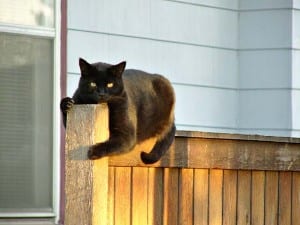 The problem of feral cats on Bowen waxes and wanes. Feral cats are intact cats, meaning that they breed. They breed fast, they interbreed, and they breed with family cats that are still intact and allowed to roam free. Intact cats fight with other cats for food, for territory, for shelter. Mostly they do not stay in one place. The male feral cats leave to copulate in other territories and spread their genes. The females leave with their family units to find other territories. In a small community like Bowen, they end up being nuisance cats and cause all kinds of problems.
The problem of feral cats on Bowen waxes and wanes. Feral cats are intact cats, meaning that they breed. They breed fast, they interbreed, and they breed with family cats that are still intact and allowed to roam free. Intact cats fight with other cats for food, for territory, for shelter. Mostly they do not stay in one place. The male feral cats leave to copulate in other territories and spread their genes. The females leave with their family units to find other territories. In a small community like Bowen, they end up being nuisance cats and cause all kinds of problems.
Intact feral cats that wander, as well as cats that are not properly cared for, are more prone to infectious diseases such as Feline Leukemia Virus (FeLV), Feline Upper Respiratory Disease, and Feline Immunodeficiency Virus (FIV). These are horrible diseases and they are easily spread amongst the feline population.
By contrast, healthy, spayed/neutered barn cats who are well fed and have warm, safe shelter are extremely likely to stay put and take care of the vermin problems on the farm or in the stables. Their very presence can deter small critters and most (but not all) will catch and kill rats and mice.
Feral cats typically inbreed, which is very bad for the cats. Inbred cats don’t live long and have more health problems, especially heart disease. And if they are having kittens at just six months old, it stunts the growth. Signs of excessive inbreeding include small litter sizes (i.e. one or two kittens), crooked noses, misaligned jaws, and abnormal eye set.
Sixteen years ago, Bowen had a major problem with feral cats. That’s one of the reasons why C.A.W.E.S. (Coast Animal Welfare & Education Society) came into being in 2000. Because of the vigilance and hard work of many C.A.W.E.S. volunteers over the years, feline infectious disease on Bowen is almost non-existent. The work involved setting up feeding stations to trap the feral cats and then getting them spayed/neutered before releasing them. Some volunteers have given hundreds of hours to tending the feeding stations and trapping the feral cats. BC SPCA is well aware of the problems caused by feral cats and has given support to this work, as has the Municipality. Bowen’s vet, Dr. Westcott, told me that he has noticed a significant decline in the feral population on Bowen Island and attributes this to the persistence and hard work of the C.A.W.E.S. volunteers. He can’t stress enough the importance of spaying and neutering all cats to prevent over-population as well prevention of certain diseases and maintaining individual and herd health.
Particular signs of inbreeding among the Bowen feral cat population were feet with five or six toes and short, misshapen tails, which were dubbed “the Bowen tail”. These tails occurred on about 50% of the cats caught at that time. Many of the cats were already infected with FIV, which means they could easily have been spreading the disease throughout the entire feline population on Bowen.
Sadly, in the past two or three years C.A.W.E.S. has once again started to receive lots of reports of feral cats. These cats don’t come out of nowhere. The only possible conclusion is that there are members of the Bowen community who have intact cats that are allowed to roam free. When female cats leave with their offspring, probably only half of the litter will survive. There have been several reports in the past two years of kittens found dead or dying, which is a clue that inbreeding is taking place and that the momma cats are too young to take proper care of their kittens.
Currently, on Bowen, there is no limitation on the number of cats that a farm owner or anybody else can adopt. Sterilized cats live longer. A good-sized group of sterilized, healthy cats will take care of the vermin problem on a farm for fifteen to twenty years. In fact, there are cats at the original C.A.W.E.S. feeding station (cats who were sterilized many years ago but never found a human family) who are still alive and kicking at sixteen or seventeen years old – and still catching rats and leaving little “gifts” for the volunteers!
About Pigeon Patrol:
Pigeon Patrol Products & Services is the leading manufacturer and distributor of bird deterrent (control) products in Canada. Pigeon Patrol products have solved pest bird problems in industrial, commercial, and residential settings since 2000, by using safe and humane bird deterrents with only bird and animal friendly solutions. At Pigeon Patrol, we manufacture and offer a variety of bird deterrents, ranging from Ultra-flex Bird Spikes with UV protection, Bird Netting, 4-S Gel and the best Ultrasonic and audible sound devices on the market today.
Voted Best Canadian wholesaler for Bird Deterrent products four years in a row.
Contact Info: 1- 877– 4– NO-BIRD (www.pigeonpatrol.ca)

